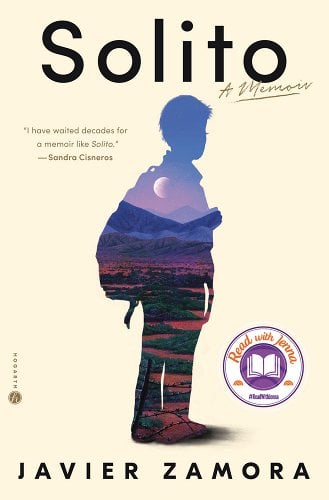Solito by Javier Zamora (Hogarth, 2022) is the stark memoir of the adventure of one nine-year-old as he traveled from his small town in El Salvador to join his parents in the U.S. in 1999. During his ordeal, Javier was abandoned by his “coyote” (the paid smuggler). He wasn’t truly alone (or, solito) as he did travel with a few other El Salvadoreans, but he was the only one looking out for himself. His tiny fake family unit (including Patricia, Patricia’s daughter Carla, and a young adult named Chino) traveled via boat, bus, foot, and truck before they reached the Mexico-U.S. border, where they attempted to smuggle across through the desert. The third crossing attempt was successful, and Javier was finally reunited with his parents.
Reading Javier’s memoir is both amazing and appalling. Although his mother had traveled with this same coyote to the U.S. in just 2 weeks, Javier’s experience did not go so well. The coyote abandoned them in Guatemala, even though he’d already been paid, so Javier and the group faced a new struggle in trying to find a way to the U.S. The difficulties Javier went through during his seven weeks of traveling were extreme, including nearly dying of thirst in the desert, being apprehended and eventually arrested by police, and facing other verbal and physical abuse. Javier’s adult helpers faced even more abuse and mistreatment. It was astounding that not only did Javier and friends make it, but also hundreds of others now in the U.S. and still at the border try themselves. Say what you will about our many immigration issues in our country (and there are many), but these people are determined to get to the U.S., and they will literally do anything.
It was one thing to read Javier’s memoir and learn about his traumatic experience. It is another to see his nine-year-old face and recognize how young he was when he went through this. My son is 15 and I guess I forgot how young he was at age nine. I found a photo of Javier at age nine: it is so young. Further, Javier was a smart kid but also quite unaccustomed to the world. At age nine, Javier still couldn’t tie his shoes properly. Coming from such a small town, he was even afraid of flush toilets! He didn’t know how to swim, so being crammed in a tiny boat with 30 other immigrants was a terrifying prospect as well. Yet, he did not have a choice. His parents had made the choice for him, and so he continued on this journey.
As is to be expected in such a difficult text, there is extensive swearing, mostly in Spanish but also in English. The things Javier experienced are not things that young children probably should read about, but he was only nine and he lived it! I’d suggest ages 12+ for reading Solito. Javier’s writing is incredibly sparse: no word is wasted as he describes his journey in the desert and the feelings he had as he sat in a crowded detention cell. His expertise as a poet comes through in his narration. It comes across as lyrical, even with the difficult content.
After I read the book, I sought out more details about Javier today. Javier himself rarely spoke of his experience until he wrote Solito with the help of therapy. His teenage PTSD in the aftermath of his journey came across as anger. He has succeeded in his American life: he attended Harvard and is now a poet and author. Now, I’m glad he has found his tentative peace by facing his demons head on in Solito.
I have mixed feelings about his parents putting him in this situation. In addition to being separated from his parents, Javier was living in a tiny village that was becoming more violent, with regular murders happening. Helping Javier flee El Salvador made logical sense for his family. That said, putting anyone through this turmoil seems pretty horrible, especially at his young age. It is such a difficult problem to solve.
Overall, though, the story of Javier’s journey shines an essential light on the plight of the thousands of immigrants who are likewise seeking refuge in our country. I wish there was a good solution to this problem, something that would allow nine-year-old children to legally immigrate to join their parents in the U.S. without having to go through such a traumatic journey.

